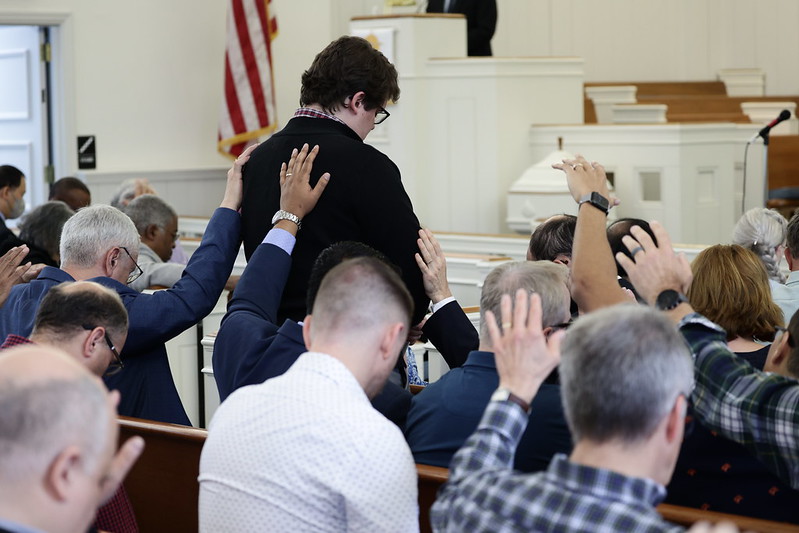 Prayer for the Rev. Graham Truscott at the 2022 EPA Clergy Session prior to his commissioning as a provisional elder. --
Rev. Steward Warner photo
Prayer for the Rev. Graham Truscott at the 2022 EPA Clergy Session prior to his commissioning as a provisional elder. --
Rev. Steward Warner photo
“I heard the voice of the Lord saying, ‘Whom shall I send, and who will go for us?’” (Isaiah 6:8a)
Although I don’t condone its tone or tactics, HBO Max’s dramatic series, Succession, is wildly popular. It’s all about the next chapter or specifically, attaining the next leadership level among those who run America’s most-watched news and entertainment cable network.
The struggle among competitors, even siblings(!), to grasp the brass ring, to run the company, is fervent and ferocious. Within our national network of United Methodist churches, of course, the competition over who will fill our pulpits is not nearly so stiff, nor so cutthroat. Yet, the challenge of “succession”–of who will go for us–in the coming days is just as dramatic and pressing.
Forty years ago, I was ordained a Deacon in the Eastern PA Conference, along with 25 other young people that same weekend. Another 20 had been ordained Elder at the Annual Conference session earlier that week. In recent years, most annual conferences, including ours, typically celebrate the retirement of dozens of pastors; but ordinations are in the single digits.
A churchwide dilemma that needs to be addressed
Our local churches simply are not raising up sufficient numbers of promising, spirit-filled candidates eager to lead us into the future of vitality and growth that we seek. This is not a private matter; this is a churchwide dilemma that needs to be addressed.
In citing the leadership gifts of Mother Teresa in particular, author Pat Williams says this: “Those who lead by serving are always trying to raise up a new generation of serving leaders to come after them, to replace them, to carry on their work.” (21 Great Leaders, p. 212)
In my former congregation, we worked ardently to establish a “Come alongside” approach to leadership succession. Everyone in leadership sought and trained and encouraged their own successors while still in the job—from the senior pastor, to youth ministry mentors, to funeral luncheon servers.
The biblical images of this successive leadership development model are legion. Elijah trained Elisha (II Kings 2). Eli prepared Samuel (I Samuel 3) Naomi taught Ruth (Ruth 1). And in the New Testament there was Paul who taught Timothy (II Timothy) and Jesus who called and prepared Peter, James, and John to carry on his mission (Mark 9:2).
A primary goal stated in our EPA Strategic Plan to be considered at Annual Conference in May is this: Creating a Culture of Calling to Pastoral Ministry. Toward that end, the Leadership Development Office–along with the Cabinet and Board of Ordained Ministry (BOOM)–offers a sample liturgy to be used in our local churches: a Call to Ministry Sunday, where we celebrate the still-speaking, still-calling voice of God. It is time to encourage all worshipers to be in the business of shoulder-tapping gifted young (and also not-so-young) people to hear that call to professional ministry in The United Methodist Church.
Here I Am, Send Me: A Call to Ministry Worship Service
Use this link to access and read the suggested order of worship prepared by two of our North District pastors and members of BOOM. It’s titled Here I Am, Send Me: Call to Ministry Worship Service. Plan to use it in your church, and please recommend it to others.
During the upcoming Sundays in May and June we will mark pastoral appointment changes, celebrate ordinations, and release new retirees. This presents an ideal occasion for a Call to Ministry Sunday in your church.
As an alternative, congregations might choose a Sunday in October, during Pastors Appreciation Month. Pastors, tell your call story! Invite testimony—live or on video—from one of your own mentors, or perhaps from a beloved former pastor of your church.
Succession planning must not be left to chance. In a time when recognizing and preparing promising new leadership is crucial in our church, you can provide powerful, much-needed opportunities for those in your congregation who may feel called to declare with Isaiah, “Here am I. Send me.”
Questions for reflection
- Do the worshipers at your church know the pastor’s personal Call story?
- What might be beneficial settings or ways for that Call story to be shared? For example, during worship or Sunday school, or in the church newsletter or bulletin—perhaps on Call to Ministry Sunday?
- What language could you use to help a potential candidate think more deeply about his/her possible calling from God to serve in professional ministry?
- What were the most effective practices which caused YOU to say “yes” to a particular invitation to service & leadership in the church?
*The Rev. Steven Morton is the EPA Conference’s Leadership Development Manager, whose work focuses on EPA’s Pathways to Congregational Fruitfulness & Health initiative. Learn about Pathways.
